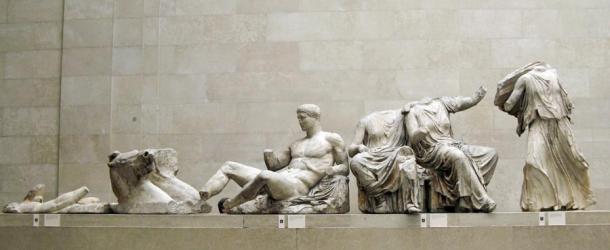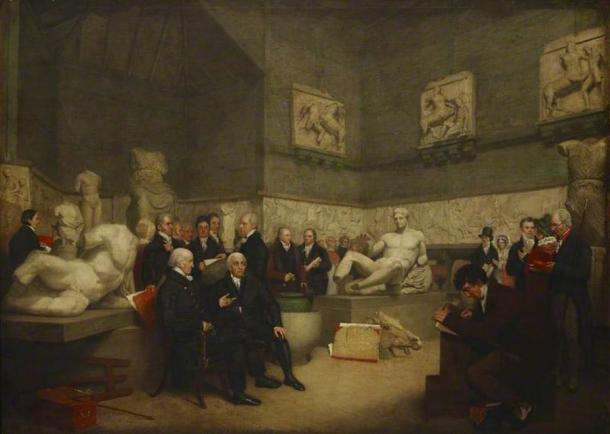
“Secret” Scans of Elgin Marbles Could Feed into Demands for Their Return
Researchers from the Oxford-based Institute of Digital Archaeology (IDA) have “secretly” made 3D scans of the controversial Elgin Marbles inside the British Museum. The idea is to create “perfect” replicas chiseled by a robot sculptor, which could then force the hand of the British government to return the original Elgin Marbles to Greece.
The Museum refused a formal request from the IDA for the scan, but security did nothing to stop Roger Michel, the IDA’s executive director, and Alexy Karenowska, the IDA’s technical director, from using their phones to scan the sculptures. “They weren't upset, if anything they seemed somewhat amused,” Michel told MailOnline. “We were being respectful. I think the museum was reluctant to give us formal permission because they don't want to be seen to be complicit in this project,” which could ultimately feed into growing demands for the return of the Parthenon Marbles to Athens.

East pediment of the Elgin Marbles on display at the British Museum, London. (Justin Norris /CC BY 2.0)
The Museum, meanwhile, stated that it was already using 3D scanning to discover more of the finer details of the marbles, including their original coloring. The Telegraph quotes a spokesman of the museum as saying: “We regularly receive requests from a wide range of commercial and academic users to undertake their own scanning, and it is not possible to routinely accommodate all of these.”
- Lost in Time Faces Revealed on the Elgin Marbles
- Will It Work? Greece Is Willing to Loan Archaeological Treasures in Exchange for the Parthenon Marbles
Laser Scans and a Robotic Phidias
Michel and Karenowska used a combination of Lidar, which uses laser light to create a 3D representation by measuring distances to a fraction of a millimeter, and photogrammetry, which takes a number of individual images and stitches them together.
These scans of the 2,500-year-old statues will then be used to program a robot sculptor to carve marble blocks with metal chisels and make exact replicas of the work of Phidias, the sculptor who created the originals in 447-438 BC. According to the Telegraph, the experts are confident of the accuracy of their copies not only because of the advanced technology they will be using but also because they plan to use the same stone from the same quarries.
Besides capturing the work of the original sculptor to the last detail, the scans created by the IDA researchers have also recorded centuries of damage caused by weathering, war, acid rain, earthquakes and the British Museum’s attempts to “clean” the marbles using wire brushes. Michel told MailOnline:
“The originals were actually brightly colored, garishly colored even, so these statues of antiquity are actually being misrepresented. They are battered old white sculptures that don't reflect what the sculptor intended. We hope that the replicas will give the British Museum an opportunity to display the marbles in an honest and exciting way that is more educational, perhaps even alongside AR (augmented reality) and VR (virtual reality) to improve the viewer's experience.”
This is not the first time the IDA is using a robot sculptor for recreating ancient works of art. In 2016, it recreated the Arch of Triumph in Palmyra, Syria. Also known as the Monumental Arch, it was built in the 3rd century during the reign of Roman Emperor Septimius Severus. It was destroyed by ISIS in 2015. However, according to Michel, the marbles will be recreated in much finer detail.
The Parthenon Marbles and Their Controversial Acquisition by Britain
When Thomas Bruce, the seventh Earl of Elgin, became British Ambassador to the Ottoman Empire in 1799, the ancient Parthenon temple in Athens was a dilapidated ruin. The Turks were then in control of Athens and Elgin negotiated a purchase of some of the sculptures from the temple with them in 1801, arguing they would be better taken care of in England.
Elgin paid a record price of £75,000 for them, but facing bankruptcy after a costly divorce sold them to the British Government for £350,000. Ever since they have been housed in the Duveen Gallery in the British Museum and are among the museum’s most popular exhibits despite their damaged state.
- Controversy Reignites as British MPs Propose Finally Returning Ancient Parthenon Marbles to Greece
- Divers find more artifacts at wreck of the Mentor, which sank carrying the Elgin Marbles
That the Ottomans had the authority to grant him permission has been widely disputed, especially since the original document was lost. Elgin was accused of looting and vandalism in Greece. Around 260 feet (80 meters) of the marbles were stripped and taken by him to London, while a smaller 164 feet (50 meters) section was left in Athens.

An imaginary representation of the Temporary Elgin Room at the Museum in 1819, with portraits of staff, a trustee, and visitors. (Public Domain)
Calls for the Elgin Marbles’ Return to Greece
In recent years, calls for the repatriation of the Elgin marbles have been growing more insistent. Even Greek Prime Minister Kyriakos Mitsotakis last year alleged that they were stolen. The UK, on the other hand, has always maintained that their possession is legal. The British government has been passing the buck for a decision on calls for their return to the museum, since that has been their home for 200 years.
The debate for and against the return of the Parthenon marbles continues to rage. Exact replicas created by the IDA are bound to weigh in on the side of arguments for their repatriation. It remains to be seen, though, how far it will influence the British Museum and the UK government.

Metope from the Parthenon Marbles depicting a Centaur and a Lapith fighting. (Kbh3rd/CC BY-SA 3.0)
Top Image: New 3D scans may help return the Elgin Marbles to Greece. Source: Miguel Cabezon /Adobe Stock
By Sahir Pandey
References
De Bruxelles, S. 2022. Stealth 3D scans of Elgin Marbles could support the call for their return to Greece. Available at: https://www.telegraph.co.uk/news/2022/03/24/stealth-3d-scans-elgin-marbles-could-support-call-return-greece/.
Tonkin, S. 2022. Elgin Marbles could be recreated in perfect detail by a ROBOT sculptor after 'digital architects' sneak into the British Museum and capture scans of the originals using phones and iPads. Available at: https://www.dailymail.co.uk/sciencetech/article-10651775/Digital-archaeologists-secretly-scan-Elgin-Marbles-inside-British-Museum.html.















